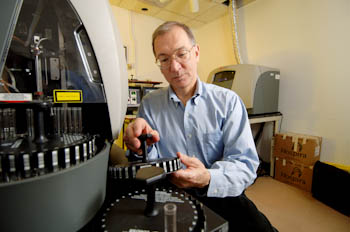Treatments that unleash the body’s own disease-fighting cells against cancer – an approach known as immunotherapy – have been heralded as the “Breakthrough of the Year” by Science magazine.
The accolade reflects the remarkable success of techniques that allow immune system T cells to make a sustained assault on cancer cells. In early-stage clinical trials, these techniques have spurred long-lasting remissions in some patients with advanced cancers.

One such technique – which uses an antibody to release the brakes on a T cell attack on cancer cells – has a long pedigree at Dana-Farber. In the early 2000s, Dana-Farber scientists led by Gordon Freeman, PhD, were the first to describe how molecules on cancer cells and T cells interact to turn off a T cell attack. This discovery opened the way to drug agents that, by blocking that interaction, allow T cells to mount their assault.
The mechanism discovered by Freeman and his colleagues involves a protein called PD-L1, which sways from the surface of a few specialized normal cells, and a complementary protein on T cells called PD-1. When PD-L1 latches onto PD-1, the T cell leaves the normal cell alone.
Freeman’s team later found that cancer cells often cloak themselves in PD-L1 (and a related protein, PD-L2) as well – thereby avoiding an immune system attack.
Pharmaceutical companies quickly seized on the finding, developing antibodies that can block PD-1, PD-L1, or PD-L2. Although the clinical trials of these drugs are still in their early stages, the results are highly promising.
One trial for example, tested a PD-1 and a PD-L1 blocker in hundreds of patients with advanced cancers that were no longer being controlled by other therapies. In all, 18 percent of patients with non-small cell lung cancer had their tumors shrink partially or completely, as did 28 percent of patients with melanoma, and 27 percent of those with kidney cancer. The hallmark of many of these remissions was their persistence: two-thirds of the patients who benefited from the drugs were still in remission when investigators checked them a year after treatment. Several other drugs that work by a similar mechanism are currently being tested, with results looking equally promising.

My dad was diagnosed with Glioma Astrocytoma Type 3, he is 84 years old. We have gone through 112 standard radiation treatments, 2 cyberknifes, 3 full chemo cycles, 1 biopsy, and 1 resection. We’ve been battling this disease for since Oct. 2 2012, when he was diagnosed via biopsy. Clinically he is better, but we’ve had one bad MRI in Dec. 12 2013, and the doctor, decided to throw in the towel, we are not about to throw in the towel, as he is clinically better, I want to know if there any other options, as he is 84 and most clinical trials only accept patients till 70.
I strongly believe that immunotherapy is the future of cancer treatment. It has clearly helped so many already while just being in the clinical trial stage. My mother had stage 4 colon cancer with metastases to the liver and lungs and was interested in doing an anti-PD1 trial at John’s Hopkins back in September, but she was too sick to make it there. The trial was also full. It would be great if more than a few people could be in a trial; many more people would be helped. Also, getting the word out about trials would be fantastic for the treatment because so many more patients could be helped. It’s fascinating that we can manipulate our own bodies to fight cancer, and I hope to be seeing much more it in the future.
Hello, does this only work on cancer masses? Is it administered during or after chemo? My father just had stage 3 colon cancer removed, with cancer found in one lymph node. He is about to begin chemo, and this is the first I have heard of this ‘treatment.’ He is 78, and I’m wondering if his case would qualify for a trial? Also, it looked very expensive–is this cost for the research institute or the patent’s insurance?
Thank you
Dear Nora —
I am so sorry to hear about your father’s health trouble. Immunotherapy is not necessarily a specific treatment, but more of an approach to developing treatments based on the concept of using the body’s own defense mechanism, the immune system, to fight cancer. It is the basis of drug development in a number of different cancers. Your father should certainly ask his oncologist about an immunotherapy treatments that are being researched for colon cancer. For more information about clinical trials, how to participate and qualify etc., visit this website. This booklet also covers more information about whether a clinical trial is the right choice, and it includes information on insurance coverage. I hope this is helpful. All the best to you and your father.
Hi Amy
I am on a very similar path to your sister, I am an identical twin, and I have been diagnosed with stage 3 metastatic melanoma, I would be really interested to hear if you ever were involved in any trails or studies related to twins and melanoma.
Thanks Mark